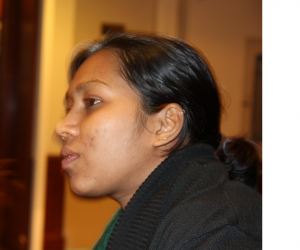Hate speech in South Asia: Country perspectives – #SAFoE
by Richa Kaul Padte
This blog post is second in a series of ten blog posts to report on the 'Third South Asian Meeting on the Internet and Freedom of Expression' recently concluded in Dhaka, Bangladesh.
If we are going to look at the content produced on the Internet from any geographical location, [we must remember that] it is a reflection of what is happening offline there.’ – Mariyath Mohamed
A contextualising of the ways in which hate speech manifests itself is key to developing a broad understanding of the issue and creating responses that are nationally and culturally relevant. However, single-country perspectives find parallels across different parts of South Asia and often resonate across national borders.
Mariyath Mohamed – a Maldivian journalist from Minivan News – speaks about the process by which the right to freedom of expression can be subverted by those with power or influence.
Following the country’s first democratic elections in 2008, people living in the Maldives began to find spaces in which to use their voices and express their opinions, which was paralleled by an increase in Internet usage. While this undoubtedly allowed the voices of anti-authoritarian or progressive individuals to flourish, Mohamed points out: ‘a lot of groups started getting louder voices, but also the more organised groups got even louder.’ This has led to the moulding of a highly conservative branch of Islam, as opposed to the more moderate forms of Islam present pre-2008.
The question of whether or not speech is criminalised is intertwined with the dynamics of power. This can be seen in the fact that the only laws restricting speech or content on the Internet in the Maldives are those directly related to religion or the defamation of public figures and politicians. This has therefore resulted in a situation where, for example, free speech advocates and bloggers find their websites blocked or shut down, but on the other hand, anti-Semitic comments from politically influential figures are seen as legally acceptable.
Mohamed asks, ‘So what, then, in this context is hate speech? And [more importantly] who will define it?’ She advocates very specific and strong legal solutions, so that regardless of who is in power, justice can be served. However, speaking from the floor, Anja Kovacs from the Internet Democracy Project, New Delhi, draws attention to how the law can be a double-edged sword, because without the political will to implement even the best laws, progress is difficult. Using the example of the anti-Semitic hate speech she questions: ‘If it is the State who is committing hate speech, how will this work?’
Parallel experiences from Pakistan once again draw attention to the ways in which, particularly within South Asian countries, the question of religion and politics (two elements between which, as Mohamed says, ‘we often can’t tell the difference’) is pertinent to a discussion of freedom of speech, both online and offline. Pakistan is one of very few countries in the world with not just one blasphemy law, but an entire series of them. This results in a troubled relationship with the principles of freedom of expression, because to even talk about or question the laws is seen as criminal under the laws themselves. A participant labels the laws ‘predatory in nature’ insofar as they target minority religions or groups.
There are currently no cyber crime laws in Pakistan, but participants from the country feel this is a good thing. Echoing Kovacs’ encouragement of extra-legal measures as a way to curb hate speech one participant says, ‘The laws that the government wants to bring in would actually impose on citizens’ rights. They are not pro-people or people-friendly. We believe that users – and the youth, who are joining cyber space rapidly – are key. We need to put more effort into education explaining how [new] communication channels can be used for social good.’
As illustrated through examples from both the Maldives and Pakistan, it is evident that the question of political manipulation and gain is crucial to any discussion around free speech. Speaking from the floor, Assistant Professor at National Law University (Delhi) Chinmayi Arun outlines the necessity of ‘mapping power relations’, because the ways in which hate speech plays itself out – both online and offline – has to do with wider issues of discrimination, marginalisation and power. As we have seen in the above examples, the law for hate speech may also often become a tool for oppression when used by a ruling majority against its minority citizens. Therefore, it is essential to consider the ways in which measures and initiatives outside the law can be used to combat hate speech and foster non-discriminatory spaces.
